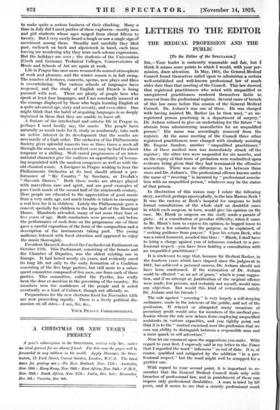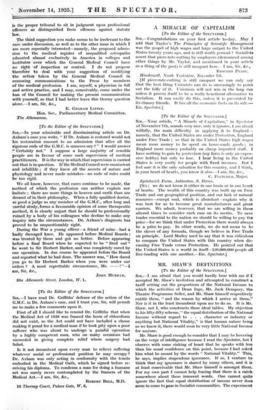LETTERS TO THE EDITOR
THE MEDICAL PROFESSION AND THE PUBLIC
[To the Editor of the SrEeveroa.1 Sin,—Your leader is eminently reasonable and fair, but I think it misses some points to which I would, with your per- mission, draw attention. In May, 1911, the General, Medical Council found themselves called upon to administer.a certain well-established and well-known professional law of much older date than that meeting of the Council. This law decreed that registered practitioners who acted with unqualified or unregistered practitioners rendered themselves liable to removal from the professional register. Several cases of breach: of this law came before this session of the General Medical Council. Dr. Axham's was one of these. He was charged with having assisted Mr. Barker (as he then was), "an un- registered person practising in a department of surgery." Dr. Axham refused to give an undertaking for the future "to abstain from administering anaesthetics for an unqualified person." His name was accordingly removed from the register. At the same meeting of the Council three other registered practitioners were charged with similarly assisting Mr. Eugene Sandow, another "unqualified practitioner." One of these medical men was immediately struck off the register ; the other two were suspended for six months, and on the expiry of that term of probation were readmitted upon evidence being given that they had terminated the offensive association. There was no difference in law between these cases and Dr. Axham's. The professional offence known under the name of " covering" is incurred by "professional associa- tion with an unqualified person," whatever may be the status of that person.
In illustration of this axiom may I relate the following story, ascribed, perhaps apocryphally, to the late Marcus Beck ? It was the custom at Beck's hospital for surgeons to hold formal consultations of the whole staff on doubtful cases in which each surgeon, in turn, would give his opinion on the case. Mr. Blank (a surgeon on the staff) made a parade of piety. At a, consultation of peculiar difficulty, when it came to Mr. Blank's turn to express his opinion, he begged leave to retire for a few minutes for the purpose, as he explained, of "seeking guidance from prayer." Upon his return Beck, who was a noted humorist, assailed him thus : "Blank, I shall have to bring a charge against you of infamous conduct in a pro- fessional respect—you have been holding a consultation .with an unqualified practitioner."
It is irrelevant to urge that, because Sir Herbert Barker, in the fourteen years which have elapsed since the judgment in 1911, has achieved a personal success, Dr. Axham should not have been condemned. If the restoration of Dr. Axham could be effected "as an act of grace," which is your sugges- tion, and if no attempt at justification of the original offence were made, few persons, and certainly not myself, would raise any objection. But would this kind of restoration satisfy Dr. Axham and his friends ?
The rule against " covering " is very largely a self-denying ordinance, made in the interests of the public, and not of the profession. If relaxed or abrogated many occasions of pecuniary profit would arise for members of the medical pro- fession whom the rule now debars from employing. unqualified assistant.% içm. various vapacities,, and you. rightly point out that it is to, the" control exercised over the profession that we owe oux,ability to distinguish between a responsible man and a mere quack or self advertiser.7. ,
Now let me comment upon the suggestions you make. With regard to your first, I expressly said in my letter to the Times that I regarded the word " infamous " as out of date. It is, of course, qualified and mitigated by the addition "in a pro- fessional respect," but the word might well be scrapped for a prettier one.
With regard to your second point, it is important to re- member that the General Medical Council deals only with breaches of professional law, and in punishment of these can impose only professional disabilities. A man is tried by his peers, and it seems to me that a strictly professional court is the proper tribunal to sit in judgment upon professional offences as distinguished from offences against statute law.
The third suggestion you make seems to be irrelevant to the ca-Se under discussion, as well as to the other issue in which I am more especially interested—namely, the proposed admis- sion to the medical register of unqualified osteopaths educated almost exclusively in America in colleges and institutes ' over which the General Medical Council have no right Of inspection or control. I do not propose therefoid to deal with your suggestion of modifying the action taken by the General Medical Council in censuring • communications to the Press by members of the medical profession. I am, myself, a physician in full and active practice, and I may, conceivably, come under the ban of the Council for making the present communication with yourself, so that I had better leave this thorny question alone.—I am, Sir, &c.,
E. GRAHAM Lrrrr.E.
Hon. Sec., Parliamentary Medical Committee. The Athenaeum.



























































 Previous page
Previous page